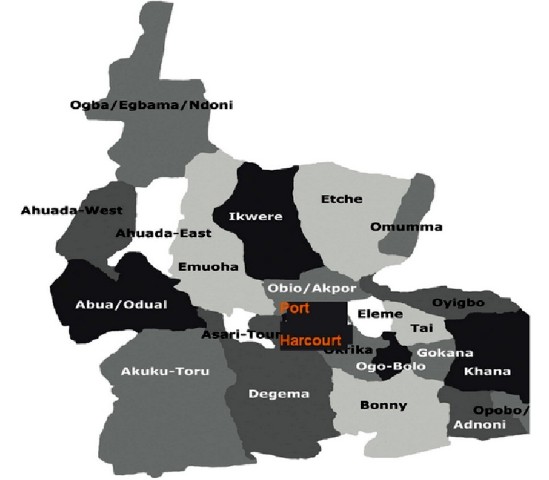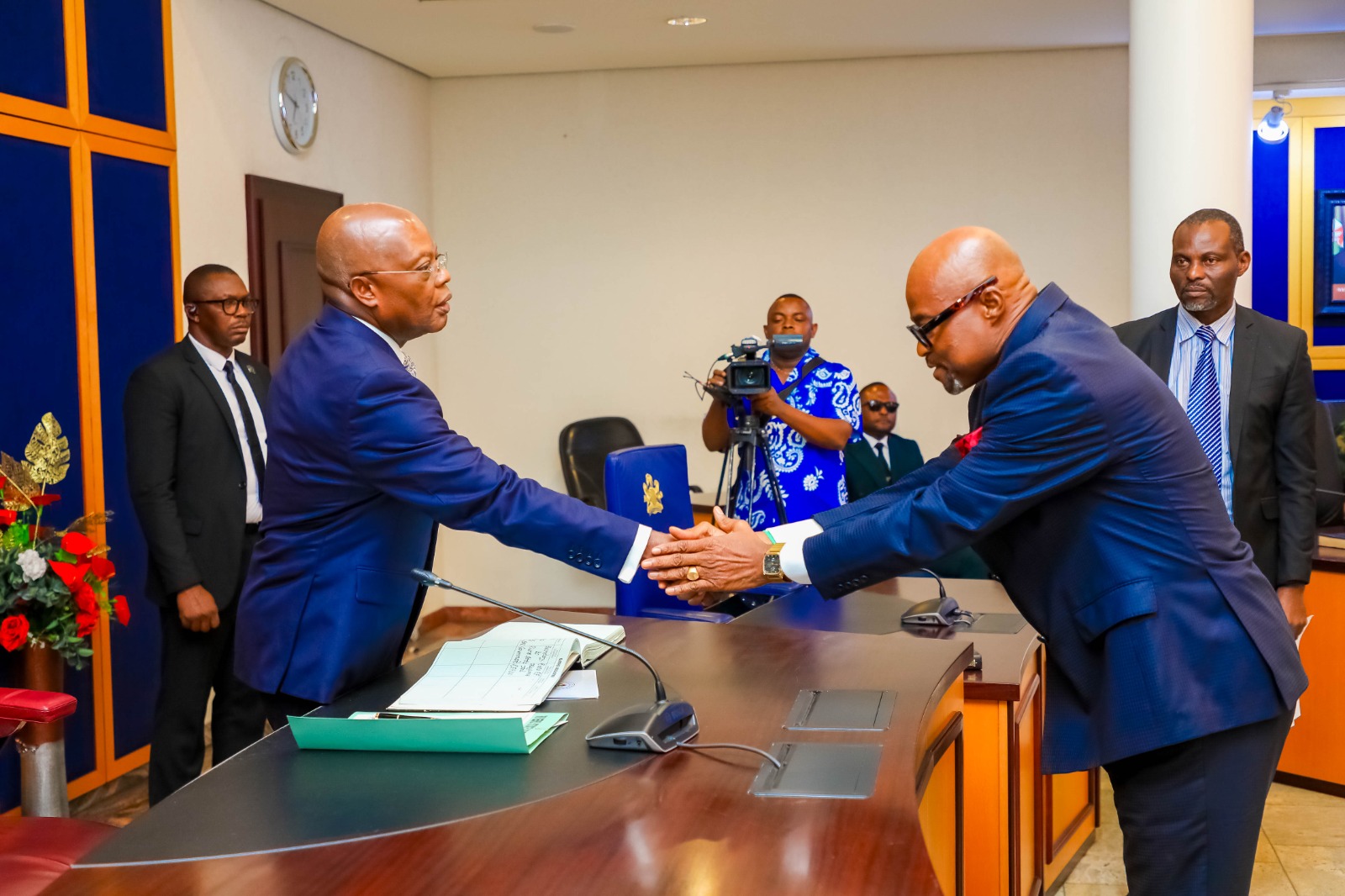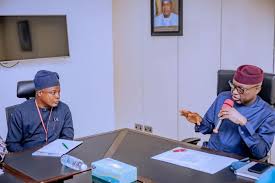Featured
The Real Story Behind Rivers Creation

Mrs Ella Prest, an indigene
of Rivers State is over 80 years and a living witness to some of the major activities that led to the emergence and development of Rivers State. As an octogenarian who personally know s some of the actors in the agitation, formation and development of Rivers State, she gave a vivid account of how Rivers State came into being and the personalities behind the creation.
Reason For The Struggle
The reason for the struggle for the creation of Rivers State was to allay the fears of marginalization, promote development and support the proper identification of the Riverine people as a distinct group in the former Eastern Region of Nigeria. This was firmly supported by the British Government, Nigerian Government and all political parties and was fought primarily by the chiefs and people of the riverine areas of the former Eastern Region.
The People, Their Identity
Rivers State, surrounded by rivers and seas, and rich in human, mineral and natural resources, is situated in the South South of Nigeria with Port Harcourt as its capital. The Rivers people consisting of Ikwerre, Kalabari, Ibani, Nembe, Yenagoa, Okrika, Ahoada, Ogoni, Opobo – Nkoro and Bile are a minority group in the southern part of the former Eastern Region along the coastal areas of Nigeria. They are mainly traders, fishermen and farmers. Most of them live on small islands and towns along the Atlantic Ocean and the creeks. They embraced education due to their early contact with the Europeans in the 17th – 18th century and a good number of them were highly educated and qualified in their various fields. The dominant group in the Eastern Region are the Ibos who live on the mainland area. They are farmers and traders with a totally different history and culture from the Rivers People.
The chiefs in the riverine area were very civilized and powerful because of their early trade contacts with the Portuguese and other Europeans that first came to the area now called Nigeria in the 17th to 18th century. Due to the lucrative trade with these riverine chiefs, the British Government in 1884 declared sovereignty over the rverine areas by establishing it as the Oil Rivers Protectorate which was confirmed in the Berlin Conference in 1885. The Oil Rivers Protectorate was administered by the British Foreign Office. This means trading with Europeans in what is now called Nigeria started in the riverine areas of the Niger Delta, Badagry and Lagos. The Rivers chiefs traded with the early Europeans in palm oil/kernel, timber and slaves in exchange for canons, coral beads and clothing. Abonnema established in 1882 was a major sea port.
The Willink Commission Report, July, 1958
This report highlighted the fears of the minority groups of the former Eastern Region and identified them as very distinct groups with a different culture from the dominant group of Eastern Nigeria. The report proposed an area for a Rivers State to be comprised of the whole of the Rivers Province which will include the Divisions of Brass, Degema, Ogoni, Port Harcourt and Ahoada together with the Western Ijaw Division from the Western Region and two small sections in Eastern Region from outside the Rivers Province, Opobo and Andoni being one, Ndoki the other.’ This confirms the claim of the riverine people as a distinct group in the then Eastern Region of Nigeria.
The anxiety about possible neglect of their area and the fear of marginalization, compelled the chiefs and people of Rivers area to form various political and pressure groups like The Ijaw Rivers Peoples’ League established on November 18, 1943; Ijaw Union, Calabar, Ogoja, Rivers State –supported by the Action Group; with Chief H. Dappa Biriye (Ibani) from Bonny as Secretary and Chief Thom Manuel (Kalabari) from Abonnema as President; Rivers State Congress (RSC.)/ Niger Delta Congress, supported by the Northern People’s Congress led by Chief Melford Okilo (Izon) from Yenagoa, and Chief H. Dappa Biriye (Ibani) from Bonny, and finally Rivers Chiefs and Peoples’ Conference (RCPC) which embraced all the sections of the riverine area, initiated and led by Chief P.G. Warmate of N.C.N.C, the ruling party in the then Eastern Region where the Rivers people were domiciled.
The RCPC eventually served as the umbrella party for all the Rivers People, irrespective of their political beliefs and differences, in the struggle for the creation of Rivers State. Chief Ordu of the N.C.N.C. from Etche was also in attendance. Chief P.G. Warmate moved the motion, seconded by Chief D.S. Oribo which gave birth to the formation of the Rivers Chiefs and Peoples Conference on 4th July, 1956 at the Rex Cinema Hall in Harbour Road, Port Harcourt. Chief P.G. Warmate further moved and was seconded by Chief D.S. Oribo for the nomination of His Royal Majesty, Francis Alagoa – Mingi X of Nembe as the Protem Chairman and Chief Harold Dappa Biriye as Protem Secretary.
This became the first effective political platform for the creation of Rivers State. It was also as a result of the Rivers Chiefs and Peoples Conference (RCPC) that the Eastern Regional Government accorded a distinct seat out of two seats intended for chiefs of former Eastern Nigeria at the Constitutional Conference in London in 1957.
Chief Dappa Biriye, being the Protem Secretary of the Chiefs and Peoples Conference (RCPC), was nominated to represent the RCPC in London in 1957 for the Nigerian Constitutional Conference and other events in 1958. Chief P.G Warmate, a top member of the NCNC, the ruling party of Eastern Nigeria, was responsible for the formation and eventual acceptance of RCPC by the then Eastern Regional Government. The Rivers Chiefs and Peoples Conference, (RCPC) became the first effective political platform for the creation of Rivers State.
These historical facts were supported by previous publications (Ref. Nigerian Tide of August 13th, 1999. Focus – 9.), and Chief E.D.W. Opuogulaya’s book – History of the Creation of the Rivers State of Nigeria.
At the time of the initial struggle, the Rivers People made several petitions and demands for state creation. These were rejected on the floor of the federal parliament. The reason given was that Rivers State was not viable for that in spite of the full commercial activities going on and the abundant resources of the area. Chief Melford Okilo, Parliamentary Secretary to the Prime Minister, Alhaji Tafawa Balewa wept openly when these decisions were taken. Chief Okilo was one of the primary activists in the struggle for the creation of Rivers State.
Isaac Adaka Boro And His Volunteer Freedom Fighters
Isaac Adaka Boro (Izon) from Yenagoa, an undergraduate from University of Nigeria, Nsukka and his fellow undergraduate freedom fighters, declared war on the Federal Government, demanding a Niger Delta Republic without which the Rivers people would no longer support the Federal Government in the civil war. The rebellion lasted 12 days. With him were Sam Owonaro (Izon), Nottingham Dick (Izon) , Nyanayo (Nembe) and Okumaye (Buguma) and many other university undergraduates from the state, who took up arms and were arraigned for treason. They were defended by Chief GKJ Amachree QC. This rebellion constituted one of the major pressures on the Federal Government for the eventual creation of Rivers State.
Apart from these activists, all the Rivers men and women were in the struggle because they all agreed to work under one umbrella irrespective of their political differences as people of one destiny to make this happen.
Finally, Gen. Yakubu Gowon, the Military Head of State, immediately after the Nigerian civil war, turned Nigeria into a 12 state nation. Rivers State was one of those 12 states created on May 27, 1967, with Port Harcourt as the state capital. Lt. Cmdr. Alfred Papapreye Diete Spiff, now the Amayanabo of Twon Brass, from Nembe, was appointed by the Federal Military Government as the First Military Governor of Rivers State.
It was, however, not immediately possible to move to Port Harcourt due to the ravages of war in the Eastern Region. It was, therefore a government in exile run from No. 24 Queens Drive, Ikoyi, Lagos, the then Federal Capital of Nigeria. So, prominent Rivers indigenes like Chief GKJ Amachree, from Buguma contributed most of the resources needed, including his office, to co-ordinate the Rivers State Military Governor’s Office in Ikoyi, Lagos and Port Harcourt, the State Capital, until 1st September, 1968.
While the military governor’s office was still in Lagos, Chief Dr. Melford Graham-Douglas, from Abonnema, was made the first administrator by the Government. Mr. Ken Sarowiwa, (Ogoni) from Khana was appointed the Administrator for Bonny, and Captain Elechi Amadi, an Ikwerre man from Alu, was also appointed the Administrator for Port Harcourt, until 1968 when the military governor took up office in Port Harcourt, the State capital.
Some of the key actors of the struggle include the following: Chief Godfrey Kio Jaja Amachree Q.C
Chief Godfrey Kio Jaja Amachree, (Kalabari) from Buguma was the first Nigerian-born Solicitor General in 1958 and by the time the colonial administration’s Legal Department was transformed into the Ministry of Justice, he also became the first Permanent Secretary.
Chief GKJ Amachree was among the first Nigerian lawyers to be admitted to the Inner Bar in Britain as a Queens Counsel at the age of 43 and was also the first black Under- Secretary General to the United Nations. He was the first Nigerian to own a private jet. He was also a key figure in the struggle for the creation of Rivers State. He was the wealthiest Rivers man who used his wealth to create wealth for the Rivers man and woman by the establishment of the Rivers State Pan African Bank Ltd, and became its first chairman.
Also, Chief W.O. Briggs, Kalabari from Abonnema was the first Federal Minister of Education from the Rivers area. He was also reappointed as Federal Minister of Trade in 1971.
Naval Lt. Cmdr. Alfred Papapreye Diete Spiff
Lt Cmdr. Alfred Papapreye Diete-Spiff, (Nembe) the first Military Governor of Rivers State took up office at the Rivers State capital, Port Harcourt on 1st September, 1968. He was a young but mature, patriotic, selfless and a listening governor; a true Rivers Son. He was supported at different times by two able Heads of Service, Chief Daniel Kalio, (Okrika) and Chief W.S. Tieinabeso (Kalabari) from Buguma, and patriotic commissioners including Prof. Isaac Dema from Abua as Chairman, Civil Service Commission, and Super Permanent Secretaries of Rivers origin who were transferred from the Federal/State Public Services to serve in Port Harcourt.
Diete Spiff made Port Harcourt one of the best state capitals in Nigeria with most of the infrastructure necessary for governance and development.
A special mention must be made of Chief (Dr). Napoleon Graham- Douglas (Kalabari), from Abonnema who was the State Attorney General and Commissioner for Justice who produced the document on Abandoned Property Law that enabled Rivers State indigenes to own landed properties in Port Harcourt and other parts of the Rivers State. Chief Eke Spiff (Nembe), the Permanent Secretary for Land and Housing Port Harcourt, with Chief C.T.Horsfall (Kalabari), from Buguma, the Surveyor General, in the same Ministry, should also be commended for preserving the State lands for good use by the Government and people of Rivers State.
The Nigerian Tide and Radio Rivers should be commended for their part in disseminating information and news in the various major languages of the State, in Ikwerre, Kalabari, Khana, Izon, and Pigeon English which gives the true identity of the Rivers People.
Ironically, the Rivers State that was rejected as not viable has become the goose that laid the golden egg, providing almost 97% of Nigeria’s income. Unfortunately the wealth enjoyed by the whole country is yet to be beneficially applied to the people of our State.
As we celebrate the 50th anniversary of the creation of Rivers State, we should reflect on the goals and aspirations of our founding fathers and see how far we have gone and plan for the future as a united people with one goal and one destiny. A golden jubilee is historically and biblically an important landmark. Our Governor Nyelson Wike who is at the helm of affairs at this point of our history is not only blessed but is saddled with the enormous responsibility of fulfilling the dreams of our founding fathers and the people of Rivers State.
Ella Prest
Featured
Bring Your Wealth Of Experience To Governance, Ibas Tasks New SSG

The Sole Administrator of Rivers State, Vice Admiral Ibok Ete Ekwe Ibas (rtd), has charged the new Secretary to the State Government (SSG), Prof Ibibia Lucky Worika to bring his wealth of experience to bear in governance of the State.
Vice Admiral Ibas (rtd) gave the charge shortly after swearing in the new SSG at the executive chambers of Government House on Wednesday night.
The Administrator who congratulated Prof Worika on his appointment said the choice was not merely an administrative decision but a statement of intent.
Vice Admiral Ibas (rtd) explained that the new SSG has an unparallel expertise in law, policy and international governance, which align perfectly with the mission to restore law, order, integrity and public trust in Rivers State.
He said: “To our new SSG, the task ahead is onerous, but your track record leaves no doubt in our minds that you will prove your mettle. Rivers State needs your intellect, grit and unweaving dedication. Together, we will write a new chapter of progress for this great state.
“Prof Worika’s role will be critical in driving this vision, ensuring that every policy, every decision and every action is in consonance with this administration’s mandate to restore law and order, stabilize the polity and to create the necessary conditions for the restoration of democratic institutions and representations.”
Vice Admiral Ibas (rtd) pointed to his maiden address to Rivers people wherein he emphasised that his administration will be committed to delivering an effective governance that is anchored on transparency, accountability and service.
He therefore, enjoined the new SSG to brace up to the demands of his office, and offer his best service as required while also working cooperatively with civil servants.
Vice Admiral Ibas (rtd) said: “You have no time to settle down. You must roll up your sleeves and get to work with the team.
“Our civil servants with whom we will work closely to run this administration are critical stakeholders and we must work with them to ensure that the state continues to function effectively during this administration.
“To the Permanent Secretaries and civil servants as a whole, once more I will ask your kind cooperation and support as we work to achieve our objectives at this time,” he added.
Featured
I Am One Of You, Sole Administrator Tells Rivers People …Warns Against Violence, Crude Oil Sabotage

The Sole Administrator of Rivers State, Retired Vice Admiral Ibok-Ete Ibas (rtd), has assured residents that he is not in the State as a partisan actor or political competitor but as a stabilising force to restore governance and order.
In a state broadcast yesterday, Ibas, who assumed duty at Government House, Port Harcourt, emphasised his commitment to protecting civil liberties and ensuring the safety of all citizens.
However, he issued a stern warning against crude oil sabotage and violence, urging residents to resist any temptation to return to past hostilities.
“For decades, I have dedicated my life to the service of our great nation—first as the 20th indigenous Chief of Naval Staff and later as Nigeria’s High Commissioner to Ghana. I answered this call out of the need for peace in Nigeria, and most importantly, in Rivers State,” Ibas stated.
Describing the prolonged political impasse as a major setback to governance and democracy, he acknowledged the hardships faced by families and businesses due to the prevailing uncertainty.
“As a son of the Niger Delta, I am one of you. I feel the weight of this crisis on families, businesses, and the future of our people,” he said.
Ibas commended President Bola Tinubu’s decisive action in declaring a state of emergency in Rivers State, stressing that it was a necessary move to restore stability and revive economic activities.
“My mandate is clear: restore law and order, ensure stability, and create an enabling environment for economic growth. But this mission requires collective support from all stakeholders, regardless of political affiliation or ethnicity,” he stated.
He discouraged attacks on oil infrastructure, reminding residents of the devastating environmental and economic consequences of such actions.
“The Niger Delta has moved beyond the destruction of oil facilities. We must resist the temptation to return to those ugly days,” he cautioned.
While pledging to uphold civil liberties and the rule of law, the Sole Administrator warned that lawlessness and violence would not be tolerated.
“We will not act arbitrarily, but we will not hesitate to deal decisively with anyone who threatens the peace and stability of Rivers State,” he declared.
Ibas revealed that he had concluded a State Security Council meeting where strategic measures were outlined to de-escalate tensions and prevent further conflict.
Expressing gratitude to President Tinubu for entrusting him with the responsibility, he also acknowledged the National Assembly for approving the emergency declaration.
“I will work closely with the national leadership under the guidance of the President. I am optimistic that Rivers State will emerge stronger and greater,” he concluded.
Featured
Abuja Truck Explosion Death Toll Rises To 10 …As Another Truck Crashes On Same Spot

The Federal Capital Territory Emergency Management Department has confirmed that 10 persons have died in the truck explosion that occurred near Karu bridge, along the Abuja-Keffi Expressway, on Wednesday.
The FEMD’s Head of Public Affairs, Nkechi Isa, confirmed the numbers in a statement, yesterday.
The Acting Director General of the Emergency Department, Abdulrahman Mohammed, had earlier confirmed that eight persons had died as of yesterday morning, with five confirmed dead on the scene, and four others burnt beyond recognition.
““Five people were taken dead from the scene yesterday (Wednesday). Out of the people that were injured, one died, making six. Then this morning (yesterday), when I asked my people to go round, they discovered that two had already died again, making eight. Four of them from yesterday were burnt beyond recognition.”, he explained.
However, in her statement, Isa said the Head, Forecasting Response and Mitigation of FEMD, Mr Mark Nyam, said eight bodies were deposited at the Karu Hospital Morgue, one body at the Asokoro Distinct Hospital Morgue while another body was deposited at the National Hospital.
He added that some victims had been referred to the Gwagwalada Teaching Hospital, Federal Medical Centre, Keffi, and Cedercrest Hospital Abuja for proper care.
Part of the statement reads, “The FCT Emergency Management Department FEMD can confirm that 10 persons lost their lives to the truck explosion that occurred at Karu bridge along Abuja / Keffi expressway.
“The Head Forecasting Response and Mitigation of FEMD, Mr Mark Nyam said eight bodies were deposited at the Karu Hospital Morgue, one body at the Asokoro Distinct Hospital Morgue while another body was deposited at the National Hospital.”
He informed that over 30 persons suffered various degrees of burns.
“Some of the victims have been referred to Gwagwalada Teaching Hospital, Federal Medical Centre,Keffi and Cedercrest Hospital Abuja for proper care,” he said.
Isa also stated that no fewer than 10 vehicles were burnt during the incident, adding that the FEMD boss after a visit to the incident scene, appealed to motorists to observe traffic rules and regulations.
He also cautioned against reckless driving, dangerous overtaking and poor maintenance of vehicles, while urging FCT residents to always use the 112 emergency toll free number in the event of an emergency.
Meanwhile, barely 24 hours after the incident, another fertiliser-laden truck has collapsed on the same spot.
The Tide learnt that the incidence occurred at about 3:54pm yesterday.
The Head of Public Affairs of the FCT Emergency Management Department, Nkechi Isa, confirmed the accident in a statement, stating that the truck collided with a Hijet and a dump truck, adding that no life was lost.
She cautioned road users to drive with caution as the Federal Road Safety Corps was making efforts to tow away the affected vehicles, to avoid traffic built up.
“Another accident has occurred under Karu bridge along the Abuja-Keffi Expressway. Thankfully, no life was lost to the incident. Our Search and Rescue say the accident occurred when a truck laden with fertilizer ran into a Hijet and a dump truck also known as tipper.
“Motorists are advised to drive with caution as the Federal Road Safety Corps is taking steps to tow away the affected vehicles in order to avoid traffic built up,” the statement read.
Meanwhile, several videos showed some persons trying to clear the fertiliser bags from the fallen truck to ease traffic.
-

 News2 days ago
News2 days agoCouncil Boss Sues For Love, Unity
-

 News2 days ago
News2 days agoIBAS, FAMILY CELEBRATE EASTER AT GOVERNMENT HOUSE CHAPEL
-

 Politics2 days ago
Politics2 days agoEkiti YPP Felicitates Christian Faithful At Easter
-

 News2 days ago
News2 days agoUS Supreme Court stops Trump from deporting migrants
-

 Maritime1 day ago
Maritime1 day agoEnugu Plans Intra Rail System To Boost Trade
-

 Rivers2 days ago
Rivers2 days agoBSN Advises Churches In Bille To Unite For Revival
-

 Sports2 days ago
Sports2 days agoNSC, NCS Approve Fixed Calendar For Sports Festival
-

 News2 days ago
News2 days agoEaster: Fubara Urges Support For Tinubu

